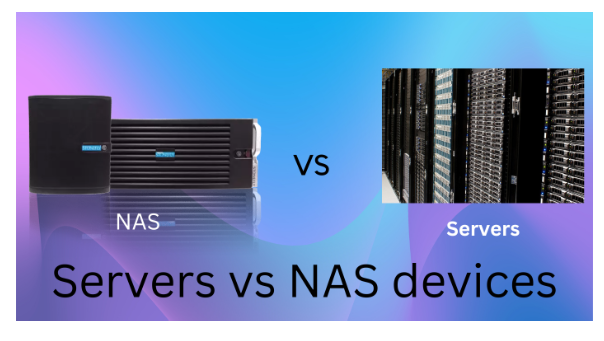When it comes to storage, there are many different options on the market. Two popular storage choices are NAS (Network Attached Storage) devices and servers. But what is the difference between these two choices? And which one is right for your needs? Keep reading to find out.
What is NAS?
NAS is a type of dedicated server that is used for file storage and sharing. NAS devices are connected to a network and can be accessed by multiple users. One benefit of using a NAS device is that it does not require a lot of technical knowledge to set up and use. NAS storage solutions could be the best option if you are looking to give access to multiple users.
NAS devices typically have one or more hard drives that are configured in a RAID array to protect against data loss in the event of drive failure. They also include a CPU, memory, and an operating system that supports the network protocols used for file sharing.
Pros of NAS devices:
1. Easy to set up and use
2. Can be accessed by multiple users simultaneously
3. NAS Storage is affordable than a server
4. Less likely to crash than a PC
5. Usually quieter than a PC
Cons of NAS devices:
1. Limited storage capacity
2. Limited processing power
3. Not as scalable as a server
What is a server?
A server is a type of computer that is designed to process requests and provide data to other computers on a network. Servers are more powerful than most PCs, and they can handle more traffic and data requests. A server is a computer program that provides functionality for other programs or devices, called “clients”. Servers are often central to the operation of large businesses and organisations. For example, a corporate email system will typically have one or more central mail servers that route messages between individual users on the network. Similarly, many internet service providers maintain central web servers that store the content of websites. When a user attempts to access a website, their request is routed to the appropriate server and the relevant content is delivered. Servers can also be used to provide streaming media, such as video or audio, and are an essential component of many popular gaming platforms. In general, servers are designed to be highly reliable and offer high levels of performance. This ensures that they can meet the demands of even the most demanding users.
Pros of using a server:
1. Can store more data than a NAS device
2. More powerful than a NAS device, so it can handle more traffic
3. Can be scaled up as needed
4. Can be used for more than just file storage (e.g., email, website hosting, etc.)
Cons of using a server:
1. Requires more technical knowledge to set up and use
2. More expensive than a NAS device Key similarities and differences between NAS and file servers While both NAS devices and servers can be used for file storage.
There are some key differences between the two choices that you should be aware of before making your decision. Here are some of the key similarities and differences between NAS devices and servers:
Key Similarities
- Both can be used for file storage –
- Both can be accessed by multiple users simultaneously –
- Both require an Ethernet connection Key differences: –
- Servers can store more data than NAS devices –
- Servers are more powerful than NAS devices, so they can handle more traffic –
- Servers can be scaled up as needed.
- Applications and Pricing When it comes to applications, both NAS devices and servers can be used for file storage, but servers have the added benefit of being able to run other applications like email, website hosting, etc. As far as pricing goes, servers tend to be more expensive than NAS devices because they are more powerful and offer more features.
Conclusion
There are many different storage options on the market, but two of the most popular are NAS devices and servers .
When deciding which option is right for you, it’s important to consider your needs carefully . If you need something that’s easy to set up and use , then a NAS device may be the better choice . However , if you need something with more power or capacity , then you may want to opt for a server . Whatever you decide, make sure you do your research so that you choose the best option for your needs.

